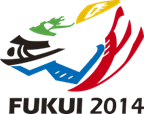
Fukui International Meeting on Human Resources Development
for Nuclear Energy in Asia
From 19th to 20th March 2014, Tsuruga-City, Fukui, Japan
Organized by
Fukui Prefectural Government
The Wakasa Wan Energy Research Center
In cooperation with the International Atomic Energy Agency (IAEA)
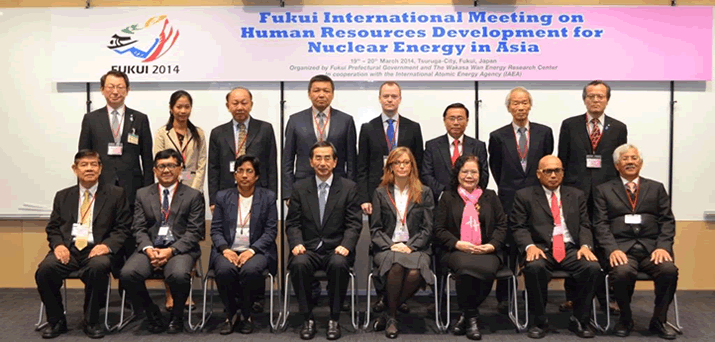
“Fukui International Meeting on Human Resource Development for Nuclear Energy in Asia” was commenced in 2010 with the principle of contribution to human resource development for nuclear energy programs in Asia. The meeting is crucial to exchange latest information of nuclear situations in some Asian countries that are planning to introduce nuclear power plants and to discussing their needs and challenges. The information obtained in the meeting is important for the WERC so as to improve its various activities. The fourth annual meeting was held from 19 to 20 March 2014 in Tsuruga-city. The Fukui prefectural government and the WERC organized the meeting in cooperation with IAEA. In addition to experts from IAEA, the senior officials such as governmental supervisors and executives of electric power companies from the seven nations, Indonesia, Kazakhstan, Malaysia, Sri Lanka, Thailand, Turkey, and Vietnam, participated in this meeting. Domestically, governmental officials, university professors, executives of electric power companies, and so on attended the meeting.
Session 1 : Opening Session
The opening session began with an address made by Mr. Issei Nishikawa, Governor of the Fukui prefecture, referring to the agreement between the prefecture and IAEA, which was concluded last October, for advancing human resources in the field of nuclear energy. On this occasion, he expressed his ambition to tie more closely with other Asian countries. Subsequently, Ms. Brenda Pagnnone from IAEA, as a representative of the cooperating organization, also made a brief address emphasizing significance of the meeting. Moreover, Dr. Alexander Bychkov, Deputy Director General of IAEA delivered an official video letter to underscore the meaning of human resource development in the introduction stage of nuclear power generation in a number of countries.
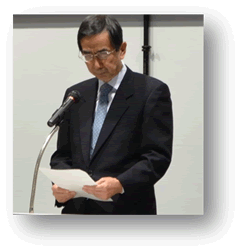 Mr. Issei Nishikawa Governor Fukui Prefectural Government |
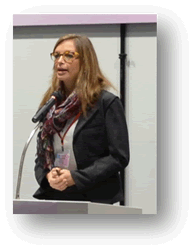 Ms. Brenda Pagannone Training Specialist Nuclear Power Divison IAEA |
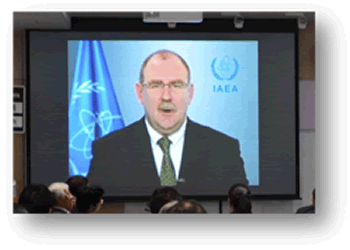 Dr. Alexander Bychkov Deputy Director General IAEA (Video Letter) |
Session 2 : Keynote Lecture
The following four keynote lecturers gave presentations and Dr. Djarot Sulistio Wisnubroto, Chairman of National Nuclear Energy Agency of Indonesia (BATAN) chaired the session. First of all, Ms. Pagannone introduced the IAEA’s strategy and efforts for human resource development. Secondly, Mr. Iwasaki from Ministry of Economy, Trade and Industry (METI) described current nuclear policy in Japan. Thirdly, Dr. Machi from the WERC provided a general lecture about nuclear application technologies in the world. Finally, Mr. Hasegawa from the Fukui prefectural government explained Fukui’s international cooperation with Asian countries for their introduction of nuclear energy. The session was truly popular and held with the doors open in order to facilitate to listen to the lectures more than 70 people from organizations concerned such as universities, electric utilities, and the municipal government.
The lecture notes of each presentation.
- Human Resources Development for Nuclear Power Programs - IAEA Perspective
- Japan’s Current Nuclear Energy Policy
- World Trends of Nuclear Applications for Industry, Agriculture, Health and Environmental Protection
- Scope of Program of Fukui Pref. Gov. for Supporting the Nuclear Program of Asian Countries
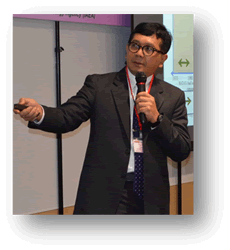 Dr. Djarot Sulistio Wisnubroto Chairman National Nuclear Energy Agency of Indonesia (BATAN) |
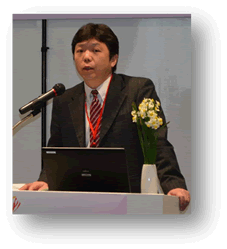 Mr. Junichi Iwasaki Deputy Director Nuclear Energy Policy Planning Division, Agency for Natural Resources and Energy Ministry of Economy, Trade and Industry |
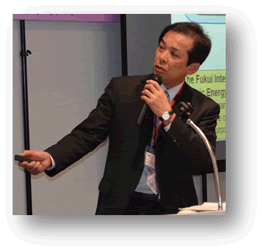 Mr. Masato Hasegawa Director Energy Producing Region Development Division, Department of General Policy Fukui Prefectural Government |
Session 3 : Strategy of Nuclear Power Program and Challenges
In the first half of the session, each representative from the six participating countries with nuclear power programs gave a presentation in the subject of “Strategy of Nuclear Power Program and Challenges”. Dr. Somporn Chongkum, Executive Director of Thailand Institute of Nuclear Technology (TINT) and Ms. Samantha Samalatha Kulatuge, Director of Sri Lanka Gamma Centre of Atomic Energy Authority (AEA), acted as moderator. Some questions in the presentations sparked an enthusiastic discussion.
Reports on the strategies of nuclear power programs
- Dr. Djarot Sulistio Wisnubroto, Indonesia
- Dr. Mazhyn Kanapinovich Skakov, Kazakhstan
- Dr. Mohd Zamzam Bin Jaafar, Malaysi
- Mr. Surapong Klowuttisatien, Thailand
- Mr. Andrey Gurlenov, Turkey
- Mr. Hung Manh Nguyen, Vietnam
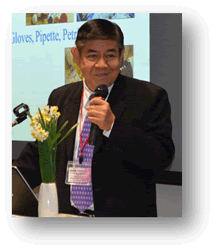 Dr. Somporn Chongkum Executive Director Thailand Institute of Nuclear Technology (TINT) |
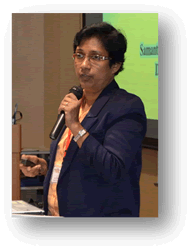 Ms. Samantha Samalatha Kulatunge Director Sri Lanka Gamma Centre Atomic Energy Authority (AEA) |
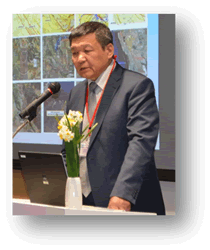 Dr. Mazhyn Kanapinovich Skakov Director of the Institute of Atomic Energy, Republican State Enterprise National Nuclear Center of the Republic of Kazakhstan (NNC) (MEMR, Indonesia) |
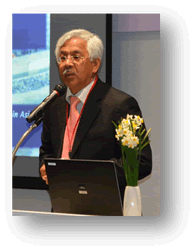 Dr. Mohd Zamzam Bin Jaafar Chief Executive Officer Malaysia Nuclear Power Corporation (MNPC) (NNC, Kazakhstan) |
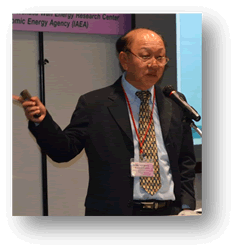 Mr. Surapong Klowuttisatien Director Nuclear Engineering Division The Electricity Generating Authority of Thailand (EGAT) |
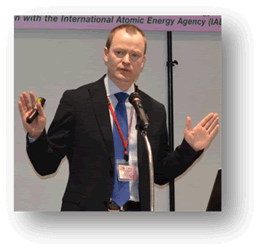 Mr. Andrey Gurlenov Deputy CEO for HR and Administration JSC “Akkuyu NPP” |
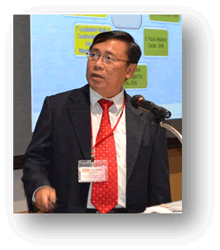 Mr. Hung Manh Nguyen Deputy Director Ninh Thuan Nuclear Power Projects Management Board Vietnam Electricity (EVN) |
Then in the latter half of the session, Dr. Muhanmad Lebai Juri, Director General of Malaysian Nuclear Agency (Nuclear Malaysia) served as chairman and led to spare time for discussion about international human resource development for nuclear energy. As an introduction to the discussion, Ms. Ninh Thi Yen Nguyen, Head of Administration Office, Vietnam Atomic Energy Agency (VAEA), explained current situations and the future plan of human resource development in Vietnam. Next, Dr. Machi presented the Japanese government’s program of human resource development for countries concerned
Presentation materials for leading speech
- HRD planning for Nuclear Power Program in Vietnam
- Program of Japanese Gov. for supporting the MSs to develop human resources for introduction of NPPs
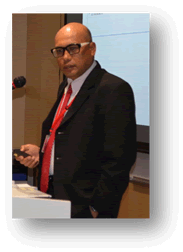 Dr. Muhamad Lebai Juri Director General Malaysian Nuclear Agency (Nuclear Malaysia) |
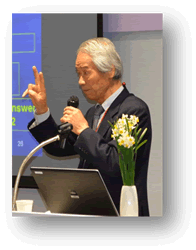 Dr. Sueo Machi Advisor The Wakasa Wan Energy Research Center Fukui International Human Resources Development Center for Atomic Energy |
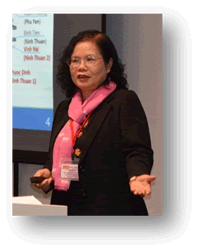 Ms. Ninh Thi Yen Nguyen Head Administration Office Vietnam Atomic Energy Agency (VAEA) |
Session 4 : Nuclear Applications for Improvement of Agriculture, Industry and Human Health
The objective of the session 4 was to share success in nuclear applications in the fields of agriculture, industry, and human health. Dr. Mazhyn Kanapinovich Skakov from Kazakhstan presided the first half of session. At the beginning of the session, representatives from Malaysia, Sri Lanka, and Thailand gave presentations regarding their notable utilization of nuclear application technologies. Followed by the presentations, two experts from Japan, Dr. Tanaka and Dr. Yamamoto, introduced Japanese advanced nuclear application to mutation breeding and cancer treatments, respectively. Many participants asked questions with respect to each presentation due to high demand for application of nuclear technologies to practice. In the latter half of the session, Dr. Machi handled discussion on national strategies and challenges in application of nuclear technologies.
Presentation materials of the session 4
- Successful commercial application of radiation processing in Malaysia: Dr. Muhamad Lebai Juri, Malaysia
- Application of nuclear technology at Sri Lanka Gamma Centre: Ms. Samantha Samalatha Kulatunge, Sri Lanka
- Success stories of radiation processing for food irradiation, gemstone coloring and medical supply sterilization in Thailand: Dr. Somporn Chongkum, Thailand
- Advanced Mutation Breeding by Heavy Ion Beams: Dr. Atsushi Tanaka, JAEA, Japan
- Advanced Radiation Therapy of Cancer by Proton Beams: Dr. Kazutaka Yamamoto, Proton Therapy Center Fukui Prefectural Hospital, Japan
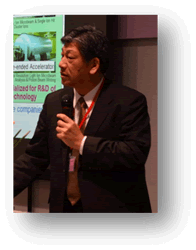 Mr. Atsushi Tanaka Unit Manager Medical and Biotechnological Application Division, Quantum Beam Science Directorate Japan Atomic Energy Agency |
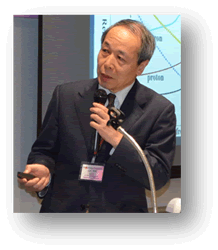 Dr. Kazutaka Yamamoto Director Proton Therapy Center Fukui Prefectural Hospital |
Session 5 : Closing Session
The conclusion of the meeting was adopted in the final session as follow.
Conclusion of Fukui International Meeting on HRD for Nuclear Energy
- HRD is essential infrastructure for implementing nuclear power program.
- Senior management of owner of nuclear power plants and Government are responsible for HRD to meet nuclear power program.
- There is good infrastructure in the Fukui Pref. in terms of nuclear facilities and experts of to support the HRD of new comer countries.
- The Gov. of Japan is going to decide the basic energy plan where nuclear energy is the important base load power and nuclear power plants should be restarted subject to approval of Nuclear Regulation Authority.
- Stakeholder involvement including public acceptance for nuclear power is the common challenge and interest of the participating countries.
- Ratio of public supporting nuclear power in Indonesia recovers from 49% in 2011 after the Fukushima nuclear accident to 60.4% in 2013.
- Restarting nuclear power plant operation in Japan as early as possible is common interest of the participating countries for improving the public acceptance of nuclear power.
- BATAN has plan to construct an Experimental Power Reactor of 1-5 MWe with inherent safety in order to demonstrate the safety of nuclear power plant, which enhance the public support of nuclear power.
- Nuclear power program of Malaysia may be delayed 4 years, namely the first NPP will start operation in 2025.
- Ninh Thuan nuclear power project of Vietnam may be delayed because of strengthening safety
- Nuclear power program of Thailand is postponed for 6 years, first NPP is planning to start 2026
- As was reported by representative of Akkuyu NPP project company Turkish project goes according to the schedule with small delays in licensing and Environmental Impact Report approval. Despite of this fact Akkuyu NPP project company performs all necessary steps to create Operating organization according to IAEA recommendations. Nevertheless first concrete is expected in 2016 O&M, and staff hiring should start by the end of 2014.
- Gov. of Vietnam allocated budget of US$150 million for the field of nuclear energy application HRD including nuclear power.
- The participating countries appreciate the support of IAEA and the Gov. of Japan, in particular MEXT and METI for HRD of nuclear power.
- Nuclear Malaysia has remarkable success stories of radiation processing application early involvement is important for industry.
- Sri Lanka Atomic Energy Authority successfully inaugurated the 1st national radiation service facility with 250 kCi in 2014 which is used for medical supply sterilization and food irradiation.
- TINT achieved the commercial application of gemstone coloring by using electron accelerator and Co-60.
- JAEA has achieved to develop new mutant varieties of plants by using ion beams of high LET which are not available by gamma ray
- Fukui Pref. Hospital is successfully treating about 450 cancer patients by proton beams since 2011.
- Proton therapy has serious challenge to decrease the price of proton accelerator.
- Several success stories in nuclear application in industry but further effort is needed to expand nuclear applications for development.
- HRD is important for nuclear application in industry and medicine.
At the end of meeting, Mr. Nobuaki Asahi, Chairman of WERC, made closing remarks.
The information given in the conclusion is very beneficial for the Fukui prefecture and the WERC which are planning more activities for international human resource development in FY 2014. Concrete suggestions in the conclusion also help the WERC to direct its initiative from now on. The Fukui prefecture and the WERC will keep holding this important conference annually for many years to come.
